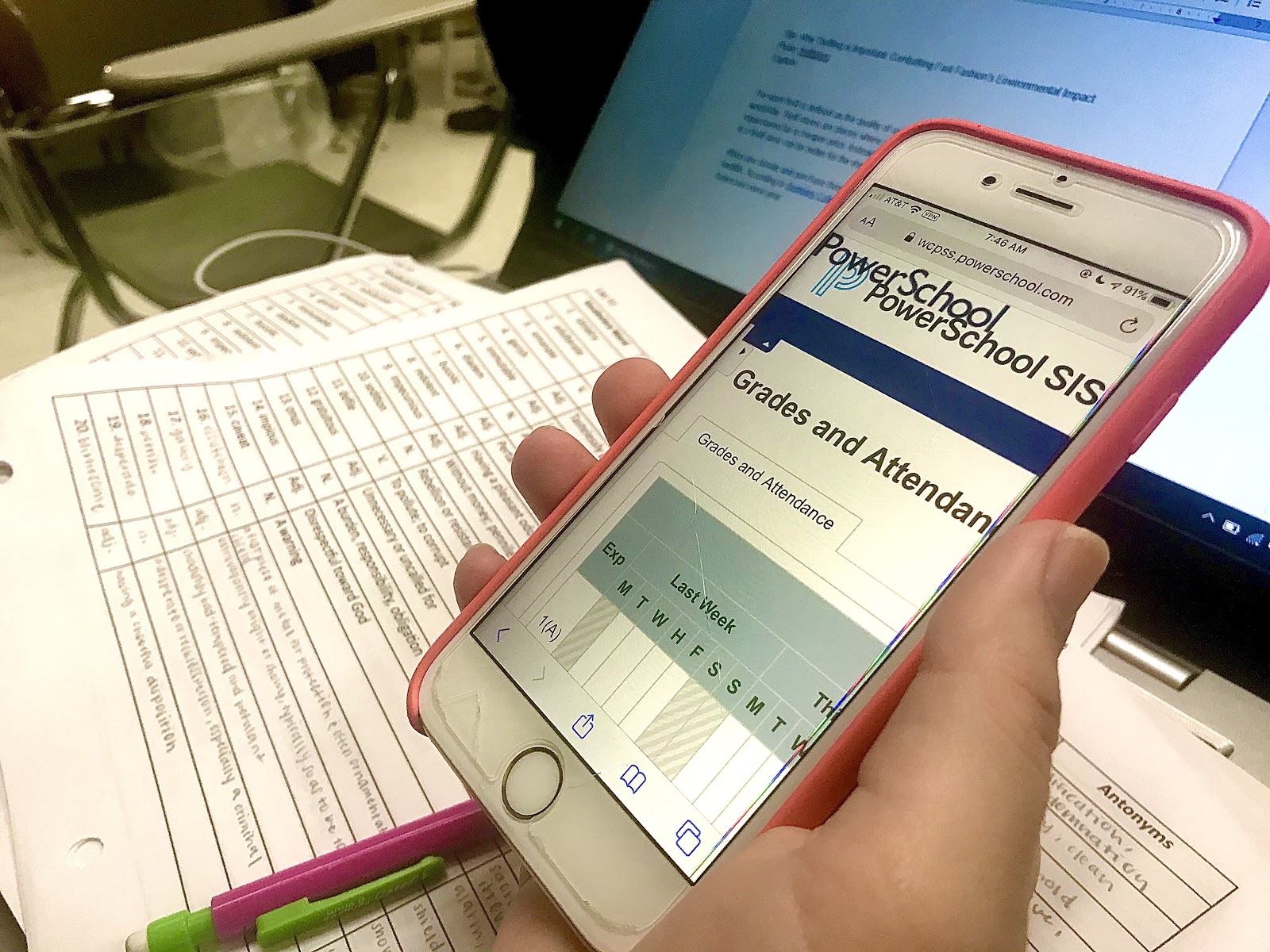Middle and high school students throughout America use Powerschool as their educational “home base.” The virtual network allows schools to create a file for every student that enters the school system. Teachers and administrators can input grades, absences, tardies, and other information into the student’s digital file. Powerschool tracks the student’s development all the way until high school graduation.
Teachers, administrators, parents, and students alike share a common platform for tracking student history and growth on Powerschool. It’s become the hidden backbone of the public education system. But to what extent does Powerschool truly benefit students, and is it possibly more harmful than helpful?
Students and parents can access their Powerschool account via the Student Portal or Parent Portal respectively. Through the portals, students and their families can view their grades and performance from past classes, as well as keep track of their present changing grades in real time. Powerschool’s mobile app makes checking grades easier than ever.
A simple notification can alert a student who’s downloaded the app of a grade change. The student can then open the app and view their grades in the given quarter to see what newly graded assignment caused the change. Powerschool also compares the new grade to the previous one, so students and parents can observe progress as the grade gets higher or lower.
Many counties across the country utilize Powerschool– Wake included. Within these counties, very few middle and high schoolers who own smartphones are without the Powerschool mobile app. It’s become a necessity among students, for whom checking grades becomes a strict regimen.
In reality, Powerschool could just be another factor that’s contributing to a growing criticism and debate in the nation’s education system. Many believe that the dependency on Powerschool has denigrated the true nature of education and encouraged students to care more about earning a certain letter grade than gaining knowledge and understanding the material they’re learning.
Olivia McGuire, a junior at Leesville Road High School, has the Powerschool mobile app and checks her grades every day. However, while she believes it’s useful to keep track of missing work, late grades, and other information, she believes the effortless accessibility of grades is a toxic factor in many students’ lives. She argues that it strengthens the role that percentages and letter grades have in defining a student, when in reality they may not be the most reliable standards of measure.
“I think the society we’re in looks at things on the surface level too much, and I think Powerschool is a perfect example of that in the school system,” said McGuire. “Now, schools and students are all about getting good letter grades rather than really obtaining knowledge. A student may have an ‘A,’ but for all we know they could be cheating and copying answers and not really know anything about what they’re supposed to be learning.”
McGuire also believes Powerschool becomes a stressor that affects students’ mental health and mindsets when it comes to school and education. She posits that students with high aspirations and the pressure to go to certain universities or obtain certain jobs may pay too much attention to the letter grade displayed on Powerschool.
“I think it’s good to be able to check your grades on your own and see if you’re missing stuff,” said McGuire, who takes her schoolwork very seriously. “But at the same time, the stress of constantly feeling like you need check what grades you’re getting can take a toll, especially if you aren’t happy with the grades you have.”
Nicole Bailey, McGuire’s mother, has a different approach to the situation. She finds Powerschool far more beneficial than harmful and believes it’s an important resource that allows parents to become more invested in their child’s schoolwork. “When we need to find out certain information, such as grades and schedules, it is a good resource,” said Bailey. “Unfortunately, not everybody is a straight A student, so if a parent isn’t on top of their child and their child’s grades, they could miss something.”
As to its effects on the value of education, Bailey believes Powerschool does not impact the nature of a student’s learning. Instead, she considers teachers to be responsible for how they choose to conduct their class and motivate their students. “Schools have their policies, but in my opinion, it depends on the kind of teacher you have in a classroom and how they encourage their students,” said Bailey. “They are the ones on the front lines and they are the ones that the kids are hearing everyday… I think the encouragement starts and ends with the teacher.”
Amy Wedge, a teacher at Leesville Road High School, sees and understands both sides of the Powerschool debate. As a teacher, she relies on it heavily and sees it as an important tool to track students’ growth. She believes the gratification of seeing their grades quickly keeps them motivated to perform. “I use it a lot, everyday. As a matter of fact, I just got feedback from my students; they like seeing it in there,” said Wedge. “I use it so that students, parents, and myself can be on the same page, so there’s a sense of transparency and communication.”
Wedge considers Powerschool a necessary facet when it comes to tracking growth and helping students succeed. “You need to have a tool or measurement by which to validate the skills you’ve learned and where you’re going from there,” said Wedge. “If you don’t have some sort of feedback to guide you, then you’re just coming here for social reasons, or for whatever. Grades are powerful to validate, ‘Okay, I am learning this.’ Not to compete against students, but to measure. This is for you.”
However, she believes student’s approach school with the wrong mentality. Powerschool encourages students to consider their grades as their identity, which in Wedge’s experience has negative effects on mental health and learning. “I can see how students may become frustrated with Powerschool. Society has said grades define who you are. But they don’t,” said Wedge. “My goal is to make students excited about learning and growing. But I have seen the pressure for grades has encouraged students to cheat, copy down homework in the locker bays…. The pressures of college, and the pressures of home, puts pressure on the student to by any means try to get those grades.”
Wedge wishes students would pay more mind to learning and less to the pressures of getting a certain grade. She’s seen students of her own suffer mentally from a decreased personal sense of worth and success. “I’ve seen it to the detriment, where they’ll do anything to make that feeling go away. Even to harm themselves. Escape methods, you know, whether it’s harming their person, through drugs, alcohol, or cutting,” said Wedge. “They don’t have someone saying, ‘You are enough as you are. You don’t need your grades to say you’re enough.’”
Furthermore, Wedge has a mixed opinion when it comes to the ability of parents to view grades on Powerschool. She believes the transparency it creates is important in allowing students to keep up with and get involved in their child’s schoolwork. “I think it’s positive, because it is a form of communication…. Everybody’s on the same page,” said Wedge. “It can be a way for parents to say ‘Good job! Your reading scores are going up!’” The downside of the easy accessibility, according to Wedge, is that it takes away from the unique role a parent plays in their child’s education. “It could actually also be negative, though, because it takes away from the sitting down and saying ‘How was your day? What did you get on that test? Why did you get that on the test?’” says Wedge. “It becomes more, ‘Oh, I’m at work, I’ll just quickly check into Powerschool, see what my child’s doing, and, oh, okay, they’re fine.’”
When it comes to efficiency, measurement, standardization, and accessibility of information, Powerschool is a necessary tool for students, parents, teachers, and administrators. It serves as a single platform through which everyone involved in a student’s education can become involved and track progress. Powerschool also increases the efficiency and timeliness with which students are able to get insight into their performance on assignments and in their classes, while staying motivated to watch their progress as they work toward a goal.
However, the downsides of making such information so readily available to students and parents is that it contributes to a much larger issue plaguing the nation’s schools today. The use of standardized testing, the emphasis on letter grades, and many other factors are causing the goal of education to be less about learning and more about statistical success. While Powerschool is part of the dilemma, fixing it would require systematic reform of American education. For now, it seems we’re stuck with Powerschool– for better or for worse.

Hi! My name is Jannah and I am a senior editor and multimedia editor for The Mycenaean. I am also a math tutor, engineering intern, and a tennis player.
